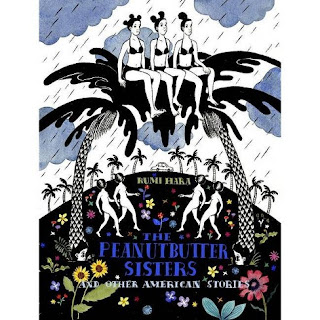Rumi Hara's new book, The Peanutbutter Sisters, is subtitled, "And Other American Stories." I asked her about this in the "Comics and Fabulism" panel at SPX, and she said that she's someone who considers herself to be both Japanese and American, as she was raised in both places. There's a lot here about what it means to be American, even as Hara navigates these environments as inherently fraught with danger.
Hara's comics here fit squarely in the fabulist camp because there's an inherent naturalism to them that is repeatedly subverted in the course of each story. Her drawing style, while expressive, maintains a steady sense of naturalism until it takes on a touch of the grotesque in order to serve the narrative. The tone of her stories is uniquely hers, but there's a strong kinship with the work of Gilbert Hernandez in Hara's comics. Beto is more interested in getting cartoony in a more exaggerated way than Hara most of the time, but Hara can go there too. Stories like "Tree Love" (containing a hilarious visual joke about a surprise erection) and "Bubblegum Fighters" start with exquisitely-rendered and even beautiful figures and then add something weird on top. The latter story is especially reminiscent of Hernandez in terms of the wild flagellations of the two girls locked in bubblegum battle. These stories are especially palate cleansers for the larger stories; small aperitifs meant to evince a chuckle.
"Verti-Go-Go" and "Living Things" flesh out their protagonists more thoroughly, but both are also more limited in scope than the two most significant stories in the collection. "Verti-Go-Go" is a delight, however, as Hara's story follows a man who is mentally transferred to a life of pure bacchanalian decadence at the sight of a bare belly button. Hara's detail in these over-the-top orgies that feature him as the center of attention is hilarious but also touching; he's not only experiencing pleasure but total validation. "Living Things" is Hara going to the limits of weirdness in this sci-fi road race story that centers on a reporter who's covering it live and on the road. It feels more like something out of Digimon than the rest of her work, and the attempts at adding a serious backstory are overshadowed by the details of the race and its alien participants.
However, "Walking With Tammy Tabata" is a tour-de-force of storytelling as teens Tammy and Steven spend an afternoon walking through the city, coming up with the settings and characters for a traditional Japanese noh play. Steven is swept along by Tammy's impulsive, inquisitive, and fearless nature, especially as she is the kind of person who not only knows how to make an adventure out of everything, she's also the sort who has a way of making everyone she encounters feel special. Tammy and Steven create magic out of the overlooked, junky, and decaying parts of the city as they forge their own friendship. Hara's draftsmanship here is superb, conveying the fine details of the city.
The book's titular story is the main event, however, recapitulating all of Hara's themes. It's set in the future in an America beset by disaster and decay. The titular sisters are triplets who are adept at riding the winds, as they scavenge junkyards to sell things on eBay. The mix of a fallen society still entirely gripped by capitalism and a supply-and-demand collector's mindset rings so true, as does their essential Southernness. The girls are named Alabama, Georgia, and Mississippi, living on an island called New Mississippi. There's an unstated logic in their story that seems ironclad yet deliberately mysterious to the reader, who is forced to take them on their own terms. That's true in the story itself, where the wary girls know how to deal with "villains" and those who would exploit them. They owe allegiance to nothing except themselves, their island, and the memory of their dead father. Indeed, the moment in time Hara captures here is one where their father has recently died; his lessons are still fresh, but their duty to him is gone. They're free to ride the winds and get a ride back on a whale whenever they like.
The sisters quarrel but are ultimately always a united front, and their story draws in as many good-hearted people as it does those who would exploit them. They are citizens and aliens all at once, belonging only to each other. It's as though they came flying out of Hara's pencil, given the way their lives fill the page with utter conviction. For Hara, these fabulist stories have a life that feels every bit as real as a naturalistic character, and she acts as an observer, spy, and documentarian of these more interesting worlds for the lucky audience.








No comments:
Post a Comment